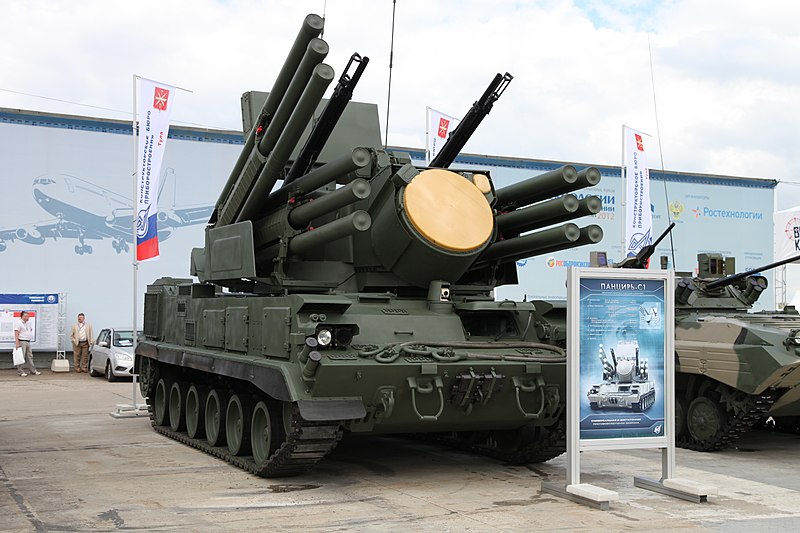As India and Japan are getting closer to Myanmar militarily to counter China, the Southeast Asian nation has not forgotten its old ally Russia. Myanmar will now receive Pantsir-S1 anti-aircraft missile and gun systems, Orlan-10E surveillance drones, and radars from Moscow.
The deal was signed during Russian Defense Minister Sergey Shoigu’s visit to the country on Thursday.
Placed under US sanctions, Russia needs to sell its weapons to avoid economic stagnation and Myanmar seeks Russia’s help to evade “scrutiny and punishment over its actions in Rakhine State at the United Nations Security Council”.
A traditional buyer of Russian arms, Myanmar has bought MiG-29 fighters, as well as helicopters, air defense missile systems, artillery, and radars. In 2018, the countries had signed a contract for six Su-30 warplanes.

Myanmar-Japan Ties
Chairman of Japan-Myanmar Association (JMA) Watanabe Hideo met Myanmar State Counselor Daw Aung San Suu Kyi, Commander-in-Chief of Defense Services Senior General Min Aung Hlaing, and other high-level officials in Naypyitaw earlier this week.
The two sides discussed ways to enhance economic and defense cooperation, according to media reports.
Japan has been the fifth largest investor in Myanmar from 2016 to 2020. It has invested more than $1.3 billion under the National League for Democracy (NLD) administration. Japan will be developing an $8-billion special economic zone at Dawei, which links the Indian Ocean to the Pacific Ocean and also joins South Asia to Southeast Asia.
Amid Chinese attempts to increase influence in the region, Myanmar has been receiving delegations from countries such as India, Japan, the US among others.
The local media in Myanmar has published articles saying that even if countries are interested in Myanmar for their own primary interests, Naypyitaw needs international cooperation due to grave challenges such as Covid-19, endless civil wars, the festering peace process, and huge numbers of internally displaced people.
India’s Act East Policy
India is looking forward to boosting ties with Myanmar. As part of its Act East Policy, India has delivered 1.5 million doses of the Covid-19 vaccine to Myanmar on Thursday.
Acting East. Acting fast.
Indian vaccines have arrived in Myanmar to contribute to our neighbour’s inoculation efforts. #VaccineMaitri pic.twitter.com/3KUwUupAXN— Dr. S. Jaishankar (Modi Ka Parivar) (@DrSJaishankar) January 22, 2021
The two sides are also focused on enhancing military ties as India has offered training and weapons, including its lightweight torpedoes. The Myanmar navy is now operating a submarine gifted by India.
Indian Foreign secretary Harsh Vardhan Shringla and the Army chief General MM Naravane had visited Myanmar in October 2020 and had discussed a range of issues — from security to connectivity.
The two countries have also agreed to operationalize the strategic Sittwe port in Rakhine State. The efforts have been ramped up to initiate steps for completion of the India-Myanmar-Thailand trilateral highway with New Delhi contributing $484 million.
Apart from their independent efforts, India and Japan are also working together in Myanmar. With Indo-Pacific in mind, India’s External Affairs Minister S Jaishankar had said:
“I think today we are trying to see whether we can cooperate and coordinate more closely in Bangladesh and Myanmar that I regard as something which would take our relationship to a very different level.”
China in Myanmar
India and Japan’s strategic interests in Myanmar are also aimed at countering China, which proposed 38 projects under the China-Myanmar Economic Corridor (CMEC), part of Beijing’s Belt and Road Initiative (BRI). In 2020, China’s had announced a $6.78 billion aid package to Myanmar for 22 projects under the Beijing-led initiative Mekong-Lancang Cooperation.
Even though the projects started-off as an attempt to build infrastructure and transport goods and services between the two countries, China’s plans to build a 2,000-km high-tech fence on its southern border has upset Myanmar.
The project is not only being seen as China’s attempt to weaken Myanmar’s sovereignty but also threaten to uproot the livelihoods of people staying in the area. The officials in the country are afraid of falling into a debt trap following investment and loans from China, hence moving towards other countries for cooperation.
Follow EurAsian Times on Google